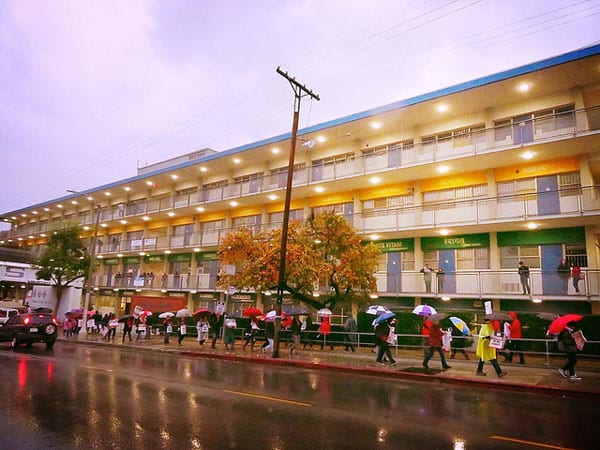
January 22, 2019; Los Angeles Times and New York Times
Los Angeles teachers ended their first strike in 30 years after union members and the Los Angeles Unified School District board both approved a contract agreement, report Howard Blume and Sonali Kohli in the Los Angeles Times. A copy of the three-year tentative agreement (now final) is available here.
The deal reached includes a six-percent salary rise for teachers—three percent retroactive to last year and three percent this year. This is basically the district’s pre-strike offer.
However, the union gained ground on issues that were more important to rank-and-file teachers, like class size. The agreement, write Blume and Kohli, “calls for a drop of one student per class next year in grades four through 12, one more the year after and two more the year after that.” Blume and Kohli, citing teachers’ union president Alex Caputo-Pearl, add that if maximum sizes are enforced, some extra-large classes could lose five to 10 students immediately. Blume and Kohli also report that, “Campuses targeted for special help—75 elementary schools and 15 middle schools—will see their class sizes drop by an additional two students. The district has 1,240 schools.”
Additionally, in the New York Times, Jennifer Medina and Dana Goldstein add that, “The deal also includes hiring full-time nurses for every school, as well as enough librarians for every middle and high school in the district by the fall of 2020.” Medina and Goldstein also note that according to the union, “The agreement also includes a pledge that the elected school board for the district will vote on a resolution asking the state to ‘establish a charter school cap’ and create a governor’s committee on charter schools.” Medina and Goldstein also quote Caputo-Pearl as saying teachers won some restrictions on the use of standardized tests.
Sign up for our free newsletters
Subscribe to NPQ's newsletters to have our top stories delivered directly to your inbox.
By signing up, you agree to our privacy policy and terms of use, and to receive messages from NPQ and our partners.
Another contract change was an agreement to create 30 community schools, in which public schools serve as hubs to bring together many partners to offer a range of supports and opportunities to children, youth, families, and communities. NPQ has covered community schools before. For instance, NPQ’s Martin Levine wrote about one such effort in Waco, Texas, a year ago. In contract negotiations in Los Angeles, Blume and Kohli report that Austin, Texas and Cincinnati, Ohio were seen as the cities that could serve as models for the Los Angeles effort. As Blume and Kohli portray the proposal, “These schools are supposed to provide social services to students and family, rich academic programs that include the arts and leadership roles for parents and teachers.”
The stakes behind the strike were large. The agreement, it may be said, has likely put a halt to the deterioration of conditions, but there is a long path of rebuilding that will need to follow. School superintendent Austin Beutner, who had been highly combative, sounded a conciliatory tone. “Public education is now the topic in every household in our community. Let’s capitalize on that. Let’s fix it.”
As for the union, Caputo-Pearl said he was impressed by the “groundswell” of support that teachers had received during the strike. This is not just rhetoric. A poll conducted by Loyola Marymount University found that 53.1 percent of Los Angeles residents “strongly supported” the strike and 25.5 percent “somewhat supported” the strike, while only 21.4 percent expressed opposition. “We have seen over the last week something amazing happened,” Caputo-Pearl told the New York Times. “We took on the idea of bargaining for the common good. Public education desperately needs attention.”
Hopefully, the new attention and energy will be put to good use to rebuild the city’s frayed public education system. One expected post-strike outcome is for the union and the school district to request more state funds to improve conditions. Because the state of California currently has a surplus of $14.8 billion (plus a “rainy day” fund of $14.5 billion), there is a reasonable chance that such efforts could bear some fruit for the nation’s second largest public school district and its workers.—Steve Dubb













